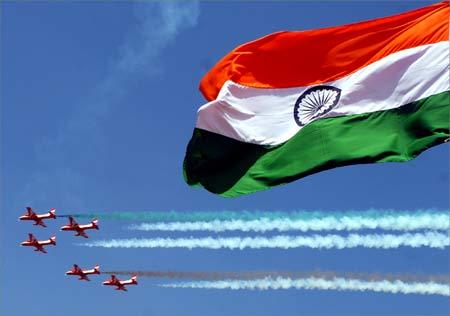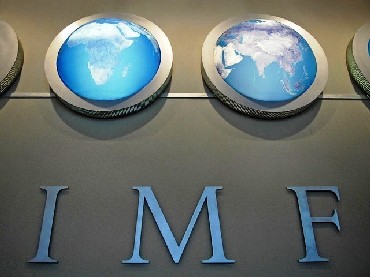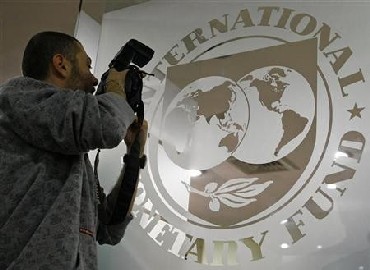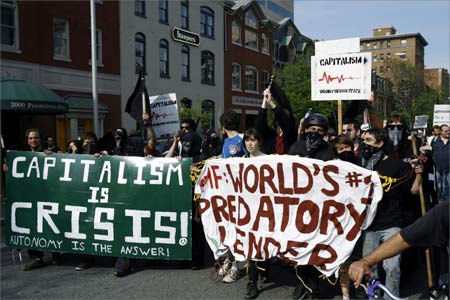 | « Back to article | Print this article |
The IMF's gloom-doom report for India, world
The International Monetary Fund expects India's economic growth rate to moderate to 7.5-7.75 per cent this fiscal, from 8.5 per cent in 2010-11, on account slowing investments and sluggish global recovery.
"In India, growth is forecast to average 7.5 to 7.75 per cent during 2011-12. Activity is expected to be led by private consumption," IMF said in its World Economic Outlook.
The report was released ahead of the annual meetings of the IMF and the World Bank which, among others, will be attended by Indian Finance Minister Pranab Mukherjee.
Investment, according to the outlook, "is expected to remain sluggish, reflecting, in part, recent corporate sector governance issues and a drag from the renewed global uncertainty and less favourable external financing environment".
Click NEXT to read on . . .
The IMF's gloom-doom report for India, world
IMF said that controlling inflation continues to remain a major challenge for India and added that despite a series of rate hikes by the Reserve Bank of India, credit growth still remains strong.
Inflation has risen to 9.78 per cent in August, much higher than the Reserve Bank of India's comfort zone of 5-6 per cent. In its bid to tame inflation, RBI has hiked key interest rates 12 times since March 2010 by 350 basis points.
RBI and the Prime Minister's Economic Advisory Council expect the country to expand by 8 per cent in the current fiscal ending March 2012.
IMF said the emerging economies have borne the brunt of the global economic crisis and China's GDP growth would average 9-9.5 per cent in 2011-12. This would mainly be on account of policy tightening.
Click NEXT to read on . . .
The IMF's gloom-doom report for India, world
"Investment growth has decelerated with the unwinding of the fiscal stimulus, but it remains the principal contributor to growth," the World Economic Outlook said.
It said that economic activity in Asia remained solid but moderated somewhat in the first half of 2011 because of the temporary disruption in supply chains from the Japanese earthquake and tsunami, especially in the automotive and electronics sectors.
Some economies in emerging Asia also experienced a slowdown in exports, growth in credit and asset prices in the first half of the year, firm consumer and business sentiment, and strong labour markets, IMF said.
It said that capital flows were sizable until recently, although more volatile in 2011. Also, activity in advanced Asia bounced back fairly strongly after the initial setback caused by the natural disasters.
However, it said that the recent debt crisis in the US and the euro zone could impact the economic growth of Asia.
Click NEXT to read on . . .
The IMF's gloom-doom report for India, world
"The recent volatility in US and euro area financial markets rippled through many Asian equity markets, which if sustained could affect the region's future economic prospects," the IMF report said.
It projected Asia's growth to decelerate but remain strong and self-sustained, assuming that the global financial tensions do not escalate.
"For emerging Asia, although the slowdown in the United States and Euro area will dampen external demand, domestic demand is expected to continue supporting growth," IMF said.
In advanced Asia, activity will be boosted by reconstruction investment, it added.
Click NEXT to read on . . .
The IMF's gloom-doom report for India, world
Global economy in a dangerous phase
Portraying a gloomy outlook for the global economy, International Monetary Fund (IMF) on Tuesday said that it is in a dangerous phase as business activity has weakened and confidence has fallen sharply.
Global growth will moderate to about 4 per cent through 2012, from over 5 per cent in 2010, IMF said in the World Economic Outlook report.
"The global economy is in a dangerous new phase. Global activity has weakened and become more uneven, confidence has fallen sharply recently, and downside risks are growing," the IMF said ahead of its annual meeting here this week.
It noted that the structural problems facing crisis-hit advanced economies have proven even more intractable than expected, and the process of devising and implementing reforms even more complicated.
Click NEXT to read on . . .
The IMF's gloom-doom report for India, world
The report said the outlook for these economies is, thus, for a continuing, but weak and bumpy expansion.
"Prospects for emerging market economies have become more uncertain again, although growth is expected to remain fairly robust, especially in economies that can counter the effect on output of weaker foreign demand with less policy tightening," it said.
Real GDP in the advanced economies is projected to expand at an anaemic pace of about 1.5 per cent in 2011 and 2 per cent in 2012, helped by a gradual unwinding of the temporary forces that have held back activity during much of the second quarter of 2011, IMF said.
However, IMF added, this assumes that Europe will contain the crisis in the euro zone, that US policymakers will strike a judicious balance between support for the economy and medium-term fiscal consolidation, and that the volatility in global financial markets does not escalate.
Moreover, the removal of monetary accommodation in advanced economies is now expected to pause.
Click NEXT to read on . . .
The IMF's gloom-doom report for India, world
"Under such a scenario, emerging capacity constraints and policy tightening, much of which has already happened, would lower growth rates in emerging and developing economies to a still very solid pace of about 6 per cent in 2012," it said.
IMF observed that the crisis in the euro zone runs beyond the control of policymakers, notwithstanding the strong policy response agreed at the July 21 EU summit.
It added that they must swiftly ratify the commitments made at the summit, and in the meantime, the European Central Bank (ECB) must continue to intervene strongly to maintain orderly conditions in sovereign debt markets.
IMF said the business activity in the US, already softening, might suffer further blows -- a political impasse over fiscal consolidation, a weak housing market, rapid increases in household saving rates, and/or deteriorating financial conditions.
"Deep political divisions leave the course of US policy highly uncertain. There is a serious risk that hasty fiscal cutbacks will further weaken the outlook without providing the long-term reforms required to reduce debt to more sustainable levels," it added.






